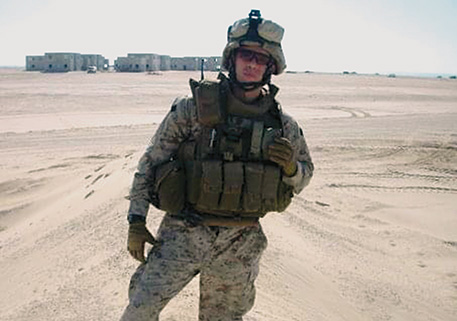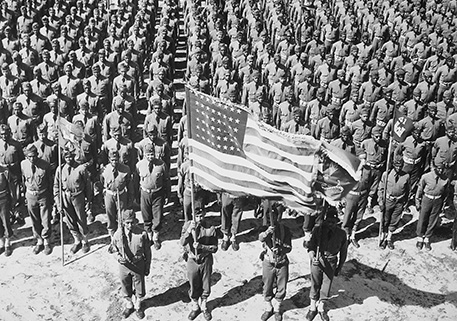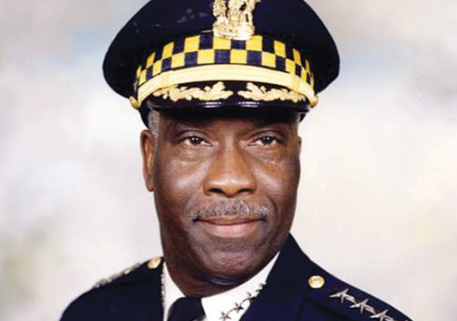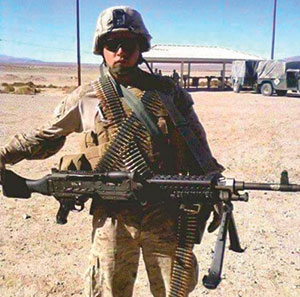
Combat-injured Marine Corps veteran receives discharge upgrade through help of DAV-sponsored pro bono program
Lafe Cotton and his wife knew he’d lose more than half of his income as a journeyman steelworker when he left Michigan to join the Marine Corps in 2008. Regardless, at 23, he felt that the experiences he’d garner as a combat engineer would provide him the knowledge needed to achieve his professional goal of becoming a general contractor when he got out. What he didn’t know was what else he’d lose along the way, or how long and difficult the journey ahead would be in attempting to recover it all.
Meritoriously promoted twice in his first 15 months of service, Cotton seemed pointed toward a promising enlistment. But six weeks into his first deployment to Afghanistan in 2010, Cotton’s Camp Lejeune-based battalion took part in the famed Battle of Marjah.
“My first deployment, we did 150 missions in seven months,” said Cotton. “There happened to be a 120-pound IED (improvised explosive device) about 100 yards from an Afghan National Army post. That’s where we got smoked.”
The blast left Cotton with a traumatic brain injury (TBI), which was immediately diagnosed by medical personnel in-country. After two weeks of light duty, his route clearance patrol team got hit by another IED just six hours into their first mission back. It wasn’t the last.
“I got blown up three times—knocked completely unconscious,” Cotton explained. “The first one is what got me, though.”
“The big one,” as Cotton calls it, severely affected his short-term memory and brought on a sensitivity to light that necessitates wearing sunglasses “pretty much everywhere.” He also began having severe migraines and uncontrollable vomiting that sometimes persists for days. Add in post-traumatic stress disorder from witnessing the deaths of friends and children overseas, and Cotton’s injuries began taking a toll when he returned home. To cope, he turned to the bottle—drinking a fifth of liquor and a case of beer each night by his estimation, on top of taking double the amount of his prescribed anti-anxiety medication.
“I didn’t drink before I joined the Marines. It’s something I kind of despised,” Cotton said earnestly. “[But I did it] so I could actually go to sleep at night. I spent the last year of my Marine Corps career going to medical appointments and sleep studies.”
Eventually, the combination of his TBI, PTSD and drinking put a strain on his marriage. It also led to a drunk driving arrest, multiple demotions in rank and a charge of disrespecting a commissioned officer. In 2012, just 17 days before his four-year contract was complete, Cotton was given an other than honorable (OTH) discharge as a private. He and his wife returned home to Michigan where they divorced the following year.
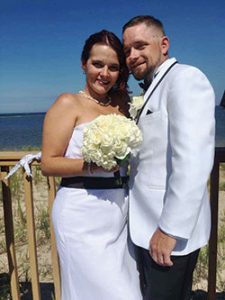

“Everyone has their own reasons for serving, but no one goes in expecting they’re going to get hurt and there’s going to be life-altering consequences because of it,” said National Service Director Jim Marszalek. “Unfortunately for Lafe, his injuries not only altered his health and marriage, but they also affected other aspects of his future because having an OTH discharge can present serious barriers for veterans once they’re out.”
These barriers include ineligibility for disability compensation, education and employment benefits, and home loans through the Department of Veterans Affairs.
“I couldn’t even go into my DMV and get ‘veteran’ designated on my ID,” Cotton explained. “Do two combat deployments, walk in and not be considered a veteran? It’s [expletive] heartbreaking.”
Hoping to gain access to the benefits he earned, Cotton first petitioned the Naval Discharge Review Board in 2013 for a discharge upgrade, which was denied. He tried two more times with the same result before a friend pointed him to The Veterans Consortium (TVC), an organization that provides veterans with pro bono legal services. Cotton reached out despite having no expectation of success after three denials in eight years.
“Generally, when a veteran applies on their own for a discharge upgrade, their success rate is very, very low,” said Danica Gonzalves, program director for TVC’s Discharge Upgrade Program, who attributed such outcomes to veterans’ lack of experience with legal burdens and processes.
“We showed that his conditions led to the subsequent behaviors that led to the discharge,” said Gonzalves. “When we can show the connection between the mental health conditions and the misconduct, the board is more likely to upgrade the discharge.”
Cotton is just one of more than 2,000 veterans TVC’s Discharge Upgrade Program provides with free legal assistance annually through the support of a $1 million grant from the DAV Charitable Service Trust. This past September, Cotton’s discharge was upgraded to general under honorable conditions—opening his eligibility to a range of VA benefits.
“At first, I was in complete disbelief about it because I had been waiting so long and trying so hard to get this done,” said Cotton. “I was elated. I was in tears. And all it took was a phone call, a few letters of recommendation and the right people.”
“To be able to help veterans get their discharge upgrade and allow them to obtain the benefits that they need is not only a success for our program but also for the veterans,” said Gonzalves. “Having DAV be a partner with us is what really allows us to reach more veterans and make a difference in their lives.”
Now remarried and once again working in steel construction, Cotton is awaiting one final letter from his neurologist before he submits his application for VA disability compensation.
After years of struggling, his newfound eligibility for VA benefits could completely change his life.
“The Veterans Consortium is a straight-up blessing,” he said.
“If I was to try to go stand in front of the Navy review board without them, I’d be [useless],” Cotton explained. “They are the [tool that you need to get the job done].”

